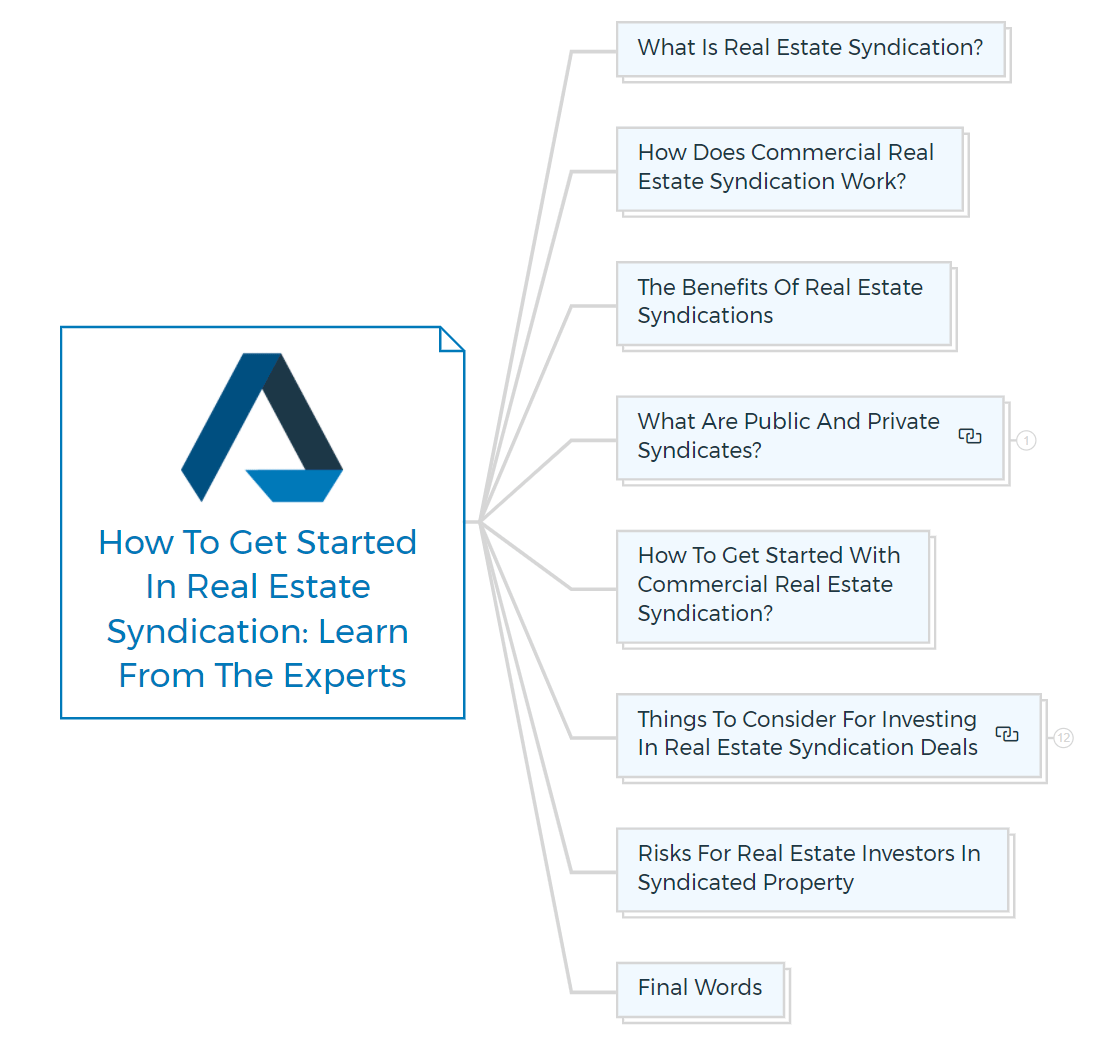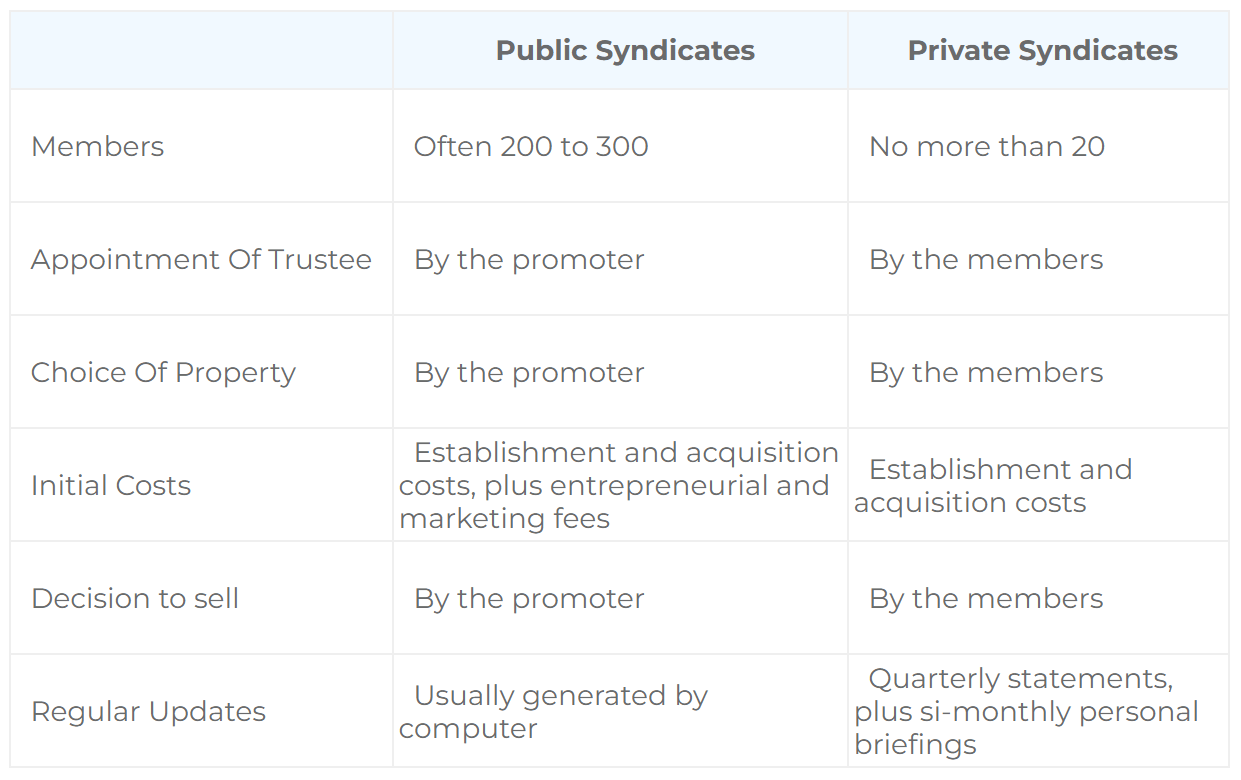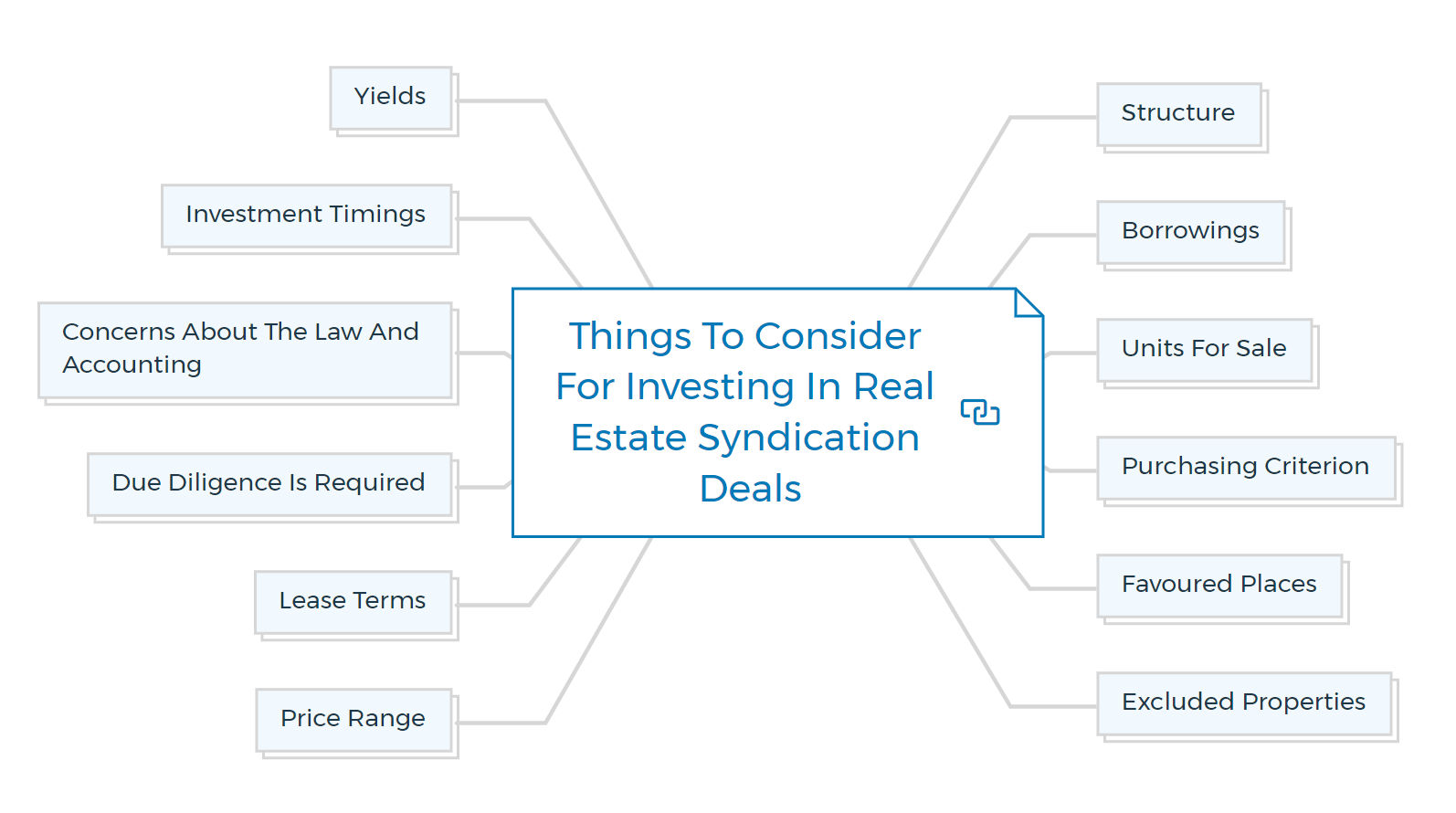Are you interested in property investment, but don't know where to start? Property syndicates may be the perfect option for you. Syndicates allow a number of investors to pool their resources and purchase property together.
This can provide investors with the opportunity to get their foot on the property ladder, while minimising their risks. If you're interested in learning more about property syndicates, keep reading. Here is everything you need to know about them, including the benefits and drawbacks.
So, what are property syndicates and how do they work? Read on to find out!

What is property syndication?
Property syndication is an investment strategy in which a group of accredited investors pool their money to purchase, renovate, and operate a property. Investors split the income from the leased property.
It can be a great way to invest in real estate without having to put up all of the capital yourself. And because you're investing with other people, you can spread the risk and potential rewards among a larger group.
How does commercial property syndication work?
Commercial property syndication works by forming a partnership between the sponsors and the investors. The sponsors are the property developers, builders, or property owners looking for capital.
Real estate investors are the people who provide the capital, usually in exchange for ownership interests in the property.
Syndicated property ownership is on rise because a syndicate permits a smaller investor—say, someone with $250,000 or less—to take advantage of a much more comprehensive range of appealing opportunities that may arise in the property market if correctly formed.
Syndicates are not the same as listed property trusts, which are the preferred approach for most small property investors.
This option involves your money being part of a vast pool invested in various residential and commercial properties. Success is frequently more closely linked to the stock market than the property market.
Instead, in a real estate syndication, you unite with others to assume direct equity in one (or sometimes two or more) properties that people choose for their attractiveness and potential.
You have a vote in the future of real estate investments, and you share in all income distributions, capital gains, and tax benefits, just like a single property owner. Indeed, having been part of impersonal public syndicates with hundreds of members, one of the primary draws for some investors is the sense of 'belonging' they feel.
You are missing out if you haven't yet subscribed to our YouTube Channel
The benefits of property Syndicates
There are many benefits to real estate investing through syndication:
- It allows you to invest in residential or commercial properties without putting up all the money yourself. It means that you can spread the risk among other accredited investors and potentially make more money if the property is booming.
- It gives you access to professional managers experienced in operating and growing properties. These professionals can help increase the value of your particular investment over time.
- Syndication offers an opportunity to invest in different real estate types, including commercial and residential properties.
What are public and private syndicates?
There are two types of real estate syndicates: public and private. Public syndicates are open to any accredited investor, while private syndicates are only open to a limited number of investors. Private syndicates usually have more control over the property and may get better deals on financing and insurance.

Difference between public and private syndicates

No matter which investment vehicle you select, it is always crucial to perform a thorough market analysis before signing the dotted lines.
How to get started with commercial property syndication?
If you're interested in getting started with commercial property syndication, there are a few things you need to do.
First, you need to find a sponsor. You can do this by networking with other investors or attending real estate investment events. Once you've found a sponsor, you'll need to review the offering documents and make sure that you understand the terms of the deal.
After that, it's time to invest! You can do this by wire transfer, check, or through an online platform.
There are pros and cons to Real Estate Syndication investments. On one side, we have multiple investors who prefer more extensive properties over $30 million, which provides investment opportunities for Real Estate Syndicators between $30 – 100 million (a sweet spot).
Secondly, Real Estate Syndications offer more transparency & better security via regulatory frameworks across different countries governing these types of investments.
In Property Syndication, lead investors or sponsors usually have a good track record & verifiable experience in successful Real Estate development & investment projects. The lead Investor or Sponsor brings together a group of like-minded investors (the "Syndicate") to invest in a particular Real Estate project.
The Lead Investor or Sponsor also provides valuable management oversight during the life of the investment, ensuring that the project stays on track to deliver the forecast returns.
A Real Estate Syndicate typically lasts for around three to five years until the project is completed and sold. At this point, profits are distributed back to the investors according to their initial investment amount & ownership stake.
The following steps summarise the Property Syndication process:
- Lead Investor or Sponsor finds a Real Estate project they believe in.
- The Lead Investor or Sponsor assembles a Syndicate of like-minded investors for passive investing in the Real Estate project.
- The Syndicate investment group reviews and approves the proposal (Offering Document)
- Once approved, each member of the syndicate invest directly into the Real Estate project.
- Each member of the syndicate has an ownership interest & right to profits generated from their investment proportional to their initial investment amount
- As the Real Estate project nears completion, funds are distributed back to each investor according to their ownership stakes/interests.
Mastermind Your First (Or Next)
Development With Industry Frameworks

Uncover "Secret Frameworks" That
Almost Nobody Knows About
That once in your hands can take ANYONE from a total newbie
to an astute property developer practically overnight...
Considerations for investing in real estate syndication deals
Consider the below things for a successful property syndicate model -

Structure
Unless members request a joint venture arrangement, syndicates are generally unit trusts. Not only is a unit trust usually the best option for legal and tax reasons, but it also protects you from future liability difficulties.
According to ASIC guidelines, there is a limit of twenty members in each syndicate, with a maximum total equity contribution of $2 million.
One can create a separate business as a syndicate trustee, with a board of directors composed of two to three unitholders, nominated by the investors to ensure that their interests are appropriately protected, for ease of management and to minimise the exposure for each syndicate member.
There could also be a property management team. The trustee then employs a competent property manager to handle day-to-day operations, ensuring that the property is in excellent shape and meets all regulatory and statutory obligations.
Borrowings
In most cases, total borrowings for a project should not exceed 65 per cent of the entire purchase price plus extra costs (such as minor renovations and the cost of finding tenants). It is purposefully cautious and does not necessitate any personal promises from you as a minimum investment.
It also means that the rental revenue should comfortably cover the interest on the loans and all other expenses. Aside from their initial up-front equity payment, investors should not be required to provide any additional funds unless otherwise agreed.
In addition, the syndicate should provide potential investors with a favorable financial return. It can change if the syndicate wants to renovate or upgrade the property, albeit the conservative character of the initial borrowings should allow for this without additional equity from most investors.
Units for sale
While there is no public market for the units, the trust deed should include a mechanism for unit transfer. Furthermore, the syndicate members should regularly examine the syndicate every four years to determine whether (and when) to sell the specific property.
If the majority of the syndicate members want to keep the property, but one or more want to sell, the trustee should raise borrowings to purchase back the units of those who want to sell.
Purchasing criterion
Here are some purchase criteria to consider. The property should be able to:
- Be appropriate for usage in an office, a retail store, or an industrial setting
- Complies with all legal and planning criteria
- Be relatively new, and have generous depreciation allowances
- Having a low level of continuous upkeep
- Be ageless or adaptable in design, with the ability to be subdivided
- Not be of a specialised nature or have a one-of-a-kind design clearly, modern conformity takes precedence!
Favoured places
Commercial property should be positioned preferably inside metropolitan regions, with a preference for those in proven locations for that specific sort of property (as assessed by specialists in the field) - usually no more than fifteen to twenty minutes from the CBD.
Excluded properties
Exclude properties with a speculative or specialised nature due to the narrowness of their market. Any full-development ideas (investments in yet-to-be-built sites) that could expose the passive investor to unnecessary risks throughout the development period would be similarly problematic.
Price range
In general, sites should be in the $3 million to $5 million areas; however, you can consider other sites if an investment syndicate prefers them.
Lease terms
Each syndicate should seek stability for passive income. Below are some suggested conditions for this -
- The lease should have a term of at least five years.
- Rentals should be reasonable - that is, at or below current market rents—with the option of market reviews.
- In smaller sites, a single-tenant should occupy most of the space.
Due diligence is required
Qualified building consultants should undertake a due diligence report on all structural and technical features of the property as a condition of each acquisition transaction. (This report verifies that a property is free of barriers.)
It will help reduce the risk of costly early maintenance or replacement costs in the future.
Concerns about the law and accounting
Before a syndicate pays any deposit, lawyers and (if necessary) tax accountants should thoroughly review all contracts.
Investment timings
When forming a syndicate, you should pay 30% of your projected investment into the syndicate upfront. The trustee would then deposit the funds into a cash management account, where they would be immediately ready to cover the initial 10% deposit on the chosen home.
You need to pay the remaining 70% of the syndicate's investment within twenty-eight days of the purchase contract's execution. While a cash commitment in a syndicate is required, it does not have to be entirely from your wallet.
The syndicate's financiers should give personal money so that syndicate members can enhance their total tax positions.
Yields
The yield should be between 7% and 9%, depending on the property type, location, condition, and most significantly, the lease structure and tenant status.
If all other factors are in place, investors should aim for a yield of 7.5 per cent to 8.5 per cent to obtain the elements for a substantial, long-term real estate investing strategy.
But, depending on the market for each type of property, this will fluctuate over time.
Risks for real estate investors in syndicated property
Like any investment vehicle, there are some risks associated with real estate syndication. One of the most significant risks is that the property may not perform as expected, and you may lose some or all of your investment.
Additionally, there is always the risk that the sponsor could disappear with your money. That's why it's essential to do your due diligence before investing in a syndicate.
Final words
The bottom line is that syndication deals are just like any other real estate investment- there is risk and reward involved. So before signing on the dotted line, make sure you consider the following:
- What is your overall strategy for real estate investing?
- Do you have enough money to cover your initial investments plus additional costs?
- What is the risk/reward profile of the deal?
- How much control do you want to have over the property?
- What are the exit options and timeline?
- Who is the sponsor, and what is their experience in syndication deals?
So, there you have it; everything you need to know about the Real Estate Syndication investment! It's essential to do your research and make sure the project fits you before investing.
If you're looking for more information or want to get started in Property Syndication, be sure to check out our blogs for more resources.
FAQs
How do real estate syndicates make money?
A real estate syndicate is a group of people who pool their money to invest in property. They make money by charging the tenants' rent and dividing it up amongst the investors. They can also make money by selling the property, but this isn't as common.
The key to making money in a real estate syndicate is to find good deals on property and then charge high rents. The more rent you can charge, the more money you'll make as an investor. It's also essential to have an excellent team to manage the property and find new tenants.
What is the difference between private and public syndicates?
The main difference between a public syndicate and a private syndicate is that members of the public syndicate have no financial interest in the syndicate. In contrast, members of a private syndicate do.
Public syndicates are typically run by a third party, such as a bank or an investment firm, while the business owners typically run private syndicates. Another key difference is that membership in a public syndicate is open to anyone who meets the minimum investment requirement. In contrast, membership in a private syndicate restricts people who know someone within the group.
The terms and conditions of each type of syndicate will vary, so it's essential to read up on them before investing.
